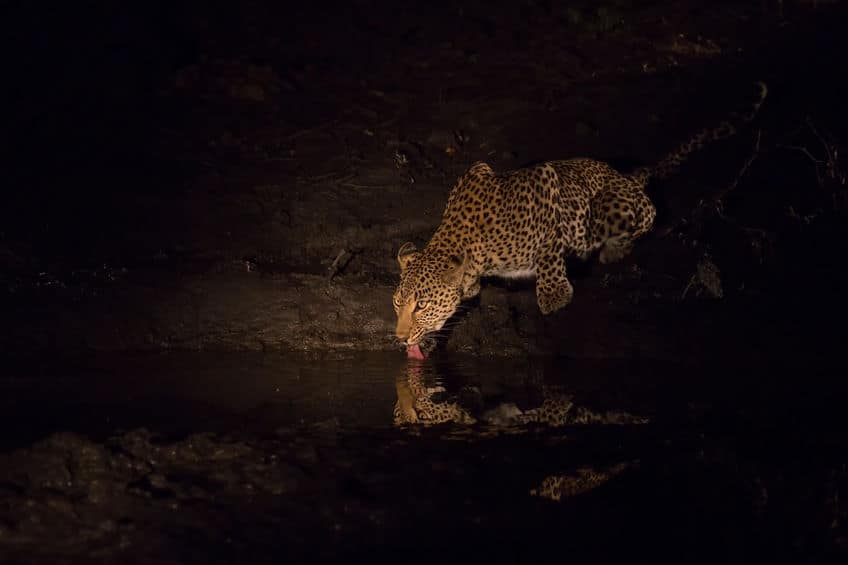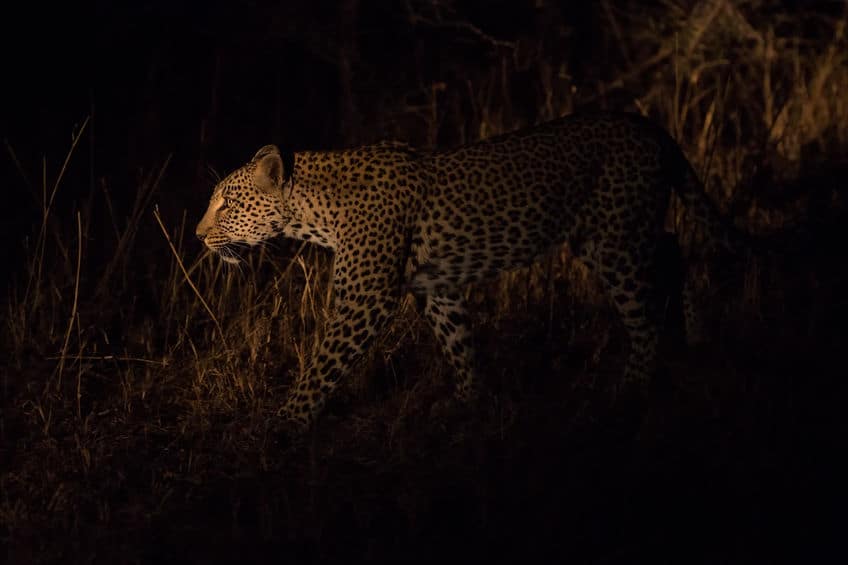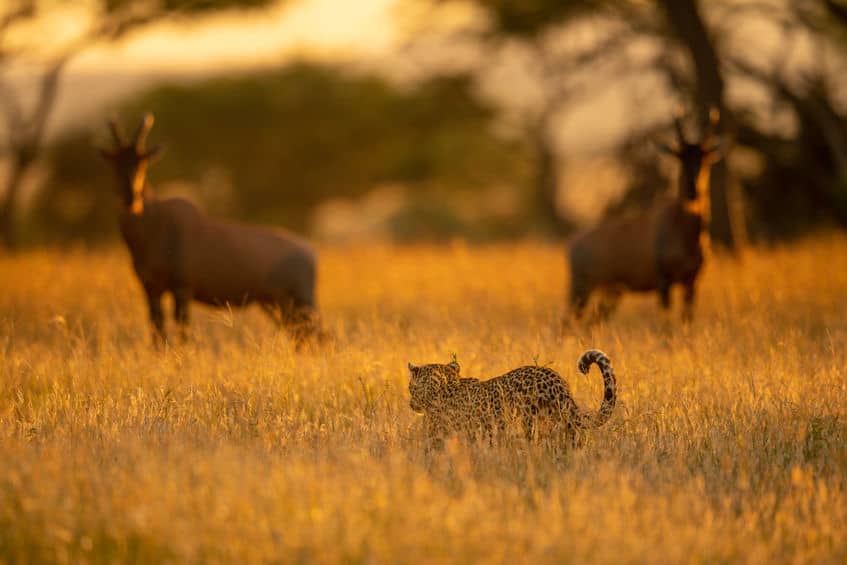
You may have heard that leopards are mostly active and hunt at night but why exactly is that? I have done some research and written this post about why leopards are nocturnal.
Leopards are nocturnal because they have several qualities that give them advantages when hunting at night. The qualities include excellent night-vision and several super-sensitive senses that allow the leopards to hunt very efficiently at night.
I have written this post to dive a bit deeper into some of the advantages leopards gain from being active at night and to answer the question of why leopards are nocturnal.
Leopards Rely on Stealth and Camouflage When Hunting
The big cats of Africa may be closely related and have many things in common but there are certainly also many points at which they are different from each other and leopards are no exception. Some of the important differences between the big cats are found in the way they hunt and which unique strengths and abilities they each have.
One of the primary reasons why leopards are nocturnal is rooted in the way they hunt.
Leopards are solitary creatures that live and hunt on their own, so unlike lions who gain several advantages by hunting as a group, leopards rely on stealth and camouflage and utilize the element of surprise to sneak up on their target prey before striking. Leopards are actually so incredibly good at sneaking around and going unnoticed that they often get as close as within just a few meters of their completely unsuspecting target before they strike.
Leopards are extraordinarily elusive predators. They have an incredible vision in low-light conditions as well as an arsenal of extremely sensitive senses that allow them to sneak around and go completely unnoticed. This gives them a major advantage over their prey animals when hunting at night.
I will go much more in-depth with the senses and strong night-vision that makes leopards such efficient night-time hunters in the following sections so stick around.
This way of hunting is quite unique to leopards compared to lions and cheetahs who each rely heavily on completely different strengths and abilities.
One of the strengths lions benefit from is their massive size. A large male lion can weigh upwards of 250 kg. (551 lb) which is eight times heavier than an average-sized male leopard. Another major strength lions have is through the collective strength of their pride. Since lions usually (but not always) stay in prides and hunt as a group, they can hunt and overpower prey that is several times larger than themself. Like leopards, lions are nocturnal.
Cheetahs are the fastest animal on land in the world and their hunting success relies heavily on the ability to accelerate and run at incredible speeds of up to 110 km/h (68 mph). Cheetahs actually hunt during the day and one of the reasons for this is that they need the ideal light conditions when running at such incredible speeds. Another reason why cheetahs hunt during the day is to avoid competition from other predators such as lions and leopards. But more on this in just a bit.
So as you can see, compared to lions and especially cheetahs, leopards benefit exceptionally well from hunting during the night where they can fully utilize their ability to sneak around in the shadows and go completely unnoticed.
A very significant part of what makes leopards able to sneak around like that is their extremely sensitive senses, so let’s take a look at those.

Leopards Have Super-sensitive Cat Senses
Like other cats, leopards are equipped with an arsenal of extremely sensitive and strong senses.
Leopards also do not only have whiskers on their face but they also have some whiskers on their legs. These whiskers are connected to some nerves that will let the leopards know as soon as something comes in contact with them. In addition to this, leopards have some very sensitive hairs in their fur all over their body.
This combination gives leopards total awareness of their own body and when combined with their excellent vision in low-light conditions, which we will talk about now, it allows them to move around and hide in dense vegetation in the complete darkness of the night without ever making a sound or being noticed.
Leopards Have Incredible Vision at night
The elusive and nocturnal leopards are so well-adjusted to moving around and hunting in the darkness of the night that very few other animals in the world, and certainly none of the other big cats of Africa, even come close.
An essential part of the reason why leopards are so well-adjusted to being active at night is their vision. Leopards have an incredibly strong night-vision that allows them to see and move around completely unnoticed much safer and much more effectively than most of their target prey animals. This night vision which is approximately seven times stronger than humans’ gives the leopards a huge advantage over their target prey animals when they hunt.
Not only does having excellent night vision and being nocturnal give leopards a big advantage over their hunting targets, but it also gives them a competitive advantage in that they do not have to compete with cheetahs which we will look at now.

Less Competition From Cheetahs
While perhaps not one of the primary reasons why leopards are nocturnal, I still thought it would be interesting to have a look at a competitive advantage they get from hunting at night and that is that they rarely have to compete with cheetahs despite having many prey animals in common.
Leopards are much bulkier and much stronger than cheetahs so it would probably beat a cheetah when fighting over prey but a cheetah sprinting at full speed can reach speeds almost twice as high as leopards can reach so they could definitely still pose a threat to leopards (or at the very least, be slightly annoying).
This is not a big issue for either leopards or cheetahs, however, and the simple reason is that cheetahs are diurnal and leopards are nocturnal.
Cheetahs are the only big cats of Africa that are diurnal and one reason why they have to be active and hunt during the day is that since their hunting takes place at such high speeds, they need the ideal light conditions which they usually find in the early morning and evening when the sun is low and lions and leopards are not very active.
How to Increase Your Chances of Spotting Leopards
Now that you know why leopards are nocturnal and what advantages they gain from hunting at night, I am going to give a couple of tips on how to spot these elusive cats.
One of the best things you can do to increase your chances of spotting leopards in Africa is to go out on a game drive and look either very early in the morning before the sun rises or very late in the evening just around or after sunset. You can either go by yourself in your own car or you can go with a professional ranger or guide. They are absolute experts when it comes to the behavior and whereabouts of African wildlife and going on a game drive with one of them will most likely increase your chance of spotting leopards (and everything else for that matter) significantly.
If you are lucky enough, you can still spot leopards during the day. On rare occasions, they can be active and hunt during the day. The chances of them doing so are significantly higher on cold and cloudy days than on warm and sunny days.
Most of the time, however, leopards will be either sleeping or resting during the day and they usually prefer to do so laying over a large branch in a tree since this provides them with shadow from the crown of the tree and safety from other African predators.
If you are interested in some more detailed tips on how to spot leopards on your safari in Africa, I recommend that you read this article which I have written specifically about that.

